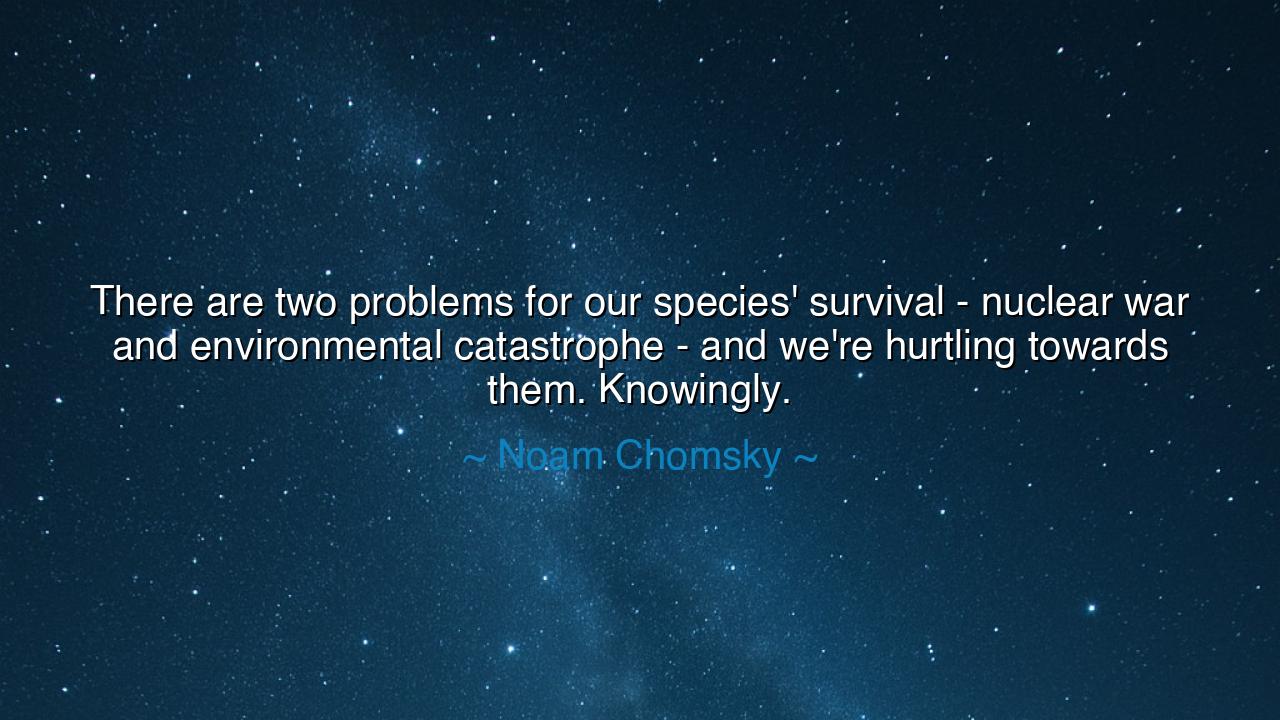
There are two problems for our species' survival - nuclear war
There are two problems for our species' survival - nuclear war and environmental catastrophe - and we're hurtling towards them. Knowingly.






In the tongue of warning bells, Noam Chomsky speaks: “There are two problems for our species’ survival—nuclear war and environmental catastrophe—and we’re hurtling toward them. Knowingly.” Hear how each clause is an iron gate. First, the measure: our species’ survival, not merely comfort or profit. Second, the twin abysses: the instant night of nuclear war, and the long unweaving of creation in environmental catastrophe. Third, the indictment: we move toward them knowingly, with lamps lit and eyes open, as if knowledge were spectacle rather than summons.
The ancients had a name for this posture: hubris. When a people adore their own cleverness, they melt idols from their tools and kneel to them. So the fire that should warm the house becomes a famine of forests; the atom that should heal the sick becomes a quick midnight for cities. Thus the saying binds two perils with one cord: misused power. In the first, power condenses into a flash of ash; in the second, power diffuses into air and ocean, a slower erasure that still ends in silence. Either way, the altar is the same—dominion without wisdom.
Let us lift a lamp from history. In the autumn of 1962, the world’s breath snagged on a wire: the Cuban Missile Crisis. Two empires squared their shoulders, and the distance between heartbeat and firestorm was measured in minutes. Yet the planet lived because a few leaders chose the humility of back-channel letters over the theater of pride. Again in 1983, a radar screen lied to a weary officer—Stanislav Petrov—whispering that missiles flew. He held his hand. He chose doubt over vengeance. A single human seam held when the fabric almost tore. These are not myths; they are proofs that nuclear war is both imaginable and defiable, and that character can be a kind of treaty.
So too with the green world’s patience. We once carved a wound in the sky—the ozone hole—with our convenient gases, and the sun began to write its anger on skin and sea. But nations bound themselves in the Montreal Protocol, and industry re-learned its craft, and the wound has begun to knit. Let this be remembered: environmental catastrophe is not fate; it is the interest on our choices. The climate’s fever, the rivers’ chemical sleep, the forests’ sudden leafless hush—these are not surprises. We proceed knowingly when we deny the weather’s testimony and the science that names our deeds.
The meaning of the oracle is therefore plain and severe: knowledge without courage becomes complicity. To say we are “hurtling” is to confess speed without steering. The remedy is an older art: to set limits as one sets stones in a levee. For the atom and the atmosphere do not bargain; they answer only to law—first the physical, then the moral. We must make our way by both.
What, then, shall we do? First, on nuclear war: demand no-first-use doctrines, verifiable arms cuts, the retirement of hair-trigger postures, the renewal of lapsed treaties, and the steady shrinking of arsenals that cannot be used without ending history. Learn your city’s role in the machinery of annihilation; protest it; vote to unbuild it. Support diplomats as you would surgeons—quiet professionals whose skill prevents visible blood. Second, on environmental catastrophe: cut the cord to fuels that shroud the air, tax the harm we emit, protect forests and wetlands as living levees, and build resilient towns where transit, housing, and energy are braided to waste less and spare more. Spend, invest, and work as if the future audits us—because it will.
Carry this lesson like a seal on your heart: the opposite of doom is not optimism; it is discipline. Let your household become a small treaty—lights governed by need, journeys shared, food traced to living soils. Let your vocation become a lever—engineer for safety, lawyer for enforcement, teacher for wonder, artist for conscience. Let your politics become a vow—choose leaders who treat survival as the first duty of office, not an afterthought beneath the ledger. And let your speech be clean of cynicism, for despair is the smog of the soul.
If we heed the oracle, our speed will become purpose. We will not be a people who saw the cliff and praised the view. We will be the generation that turned—late, perhaps, but knowingly—and set our faces toward life. For wisdom is the art of stopping in time, and courage is the will to do it together. Between the flash and the fever, choose the road of covenant. Between power and prudence, choose both—power ordered by prudence—and walk on, leaving to our children not an epitaph, but a planet and a peace.






AAdministratorAdministrator
Welcome, honored guests. Please leave a comment, we will respond soon